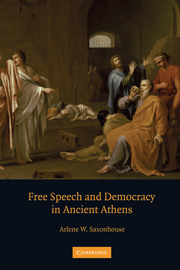PART I - INTRODUCTION
Published online by Cambridge University Press: 06 January 2010
Summary
THE INVOCATION OF ATHENS
In the early decades of the nineteenth century, George Grote wrote his memorable multivolume history of Greece. In striking contrast to the popular view of the historians of his time and earlier centuries, democratic Athens shines forth in his work as a wondrous regime of freedom and creativity rather than as a warning about the chaos and tyranny of mob rule. After recording several paragraphs of Pericles' Funeral Oration as presented in Thucydides' history, Grote reflects wistfully: “nor can we dissemble the fact that none of the governments of modern times … presents any thing like the picture of generous tolerance towards social dissent, and spontaneity of individual taste, which we read in the speech of the Athenian statesman” ([1851–56] 1900:6.150). If only “the governments of modern times” could recapture those practices of freedom of which Pericles spoke, Grote seems to muse here, then the modern world might again be able to produce the monuments of culture that emerged from the freedoms of ancient Athens. Benjamin Constant in his justly famous speech of 1819 warns Europe about romanticizing the liberty of the ancients so praised in authors like Rousseau and imagined in the events of the French Revolution. But among the ancients he excepted the Athenians whose dedication to commerce gave, he writes, “its citizens an infinitely greater liberty than Sparta or Rome” (1988: 315). If one sought to define the benefits of liberty in the nineteenth century, Athens could serve as a potent model.
- Type
- Chapter
- Information
- Free Speech and Democracy in Ancient Athens , pp. 11 - 15Publisher: Cambridge University PressPrint publication year: 2005

